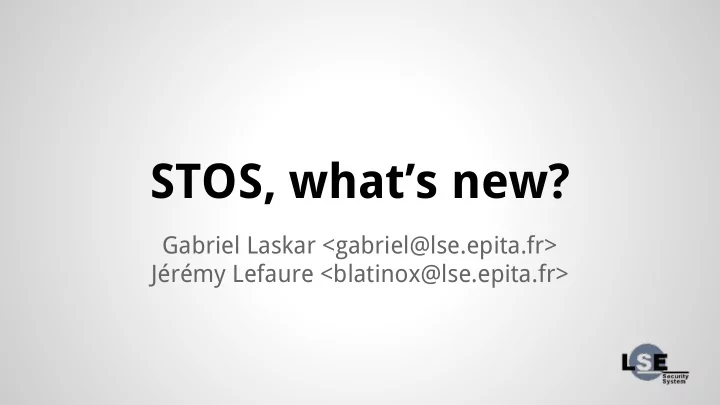

STOS, what’s new? Gabriel Laskar <gabriel@lse.epita.fr> Jérémy Lefaure <blatinox@lse.epita.fr>
What is STOS? ● A toy operating system ● Modular ● A teaching & experimenting tool
Main principles of the STOS kernel ● Monolithic kernel ● Modular architecture ● (probably) Multi-architecture ● Simple.
Emphasis on simple ● No surprises ● When in doubt, mimic the linux kernel APIs. ● Still some differences with a classic unix kernel
mkdir(3) /* * In stos, mkdir can be emulated with open, * so use it instead of creating another syscall. */ int mkdir(const char* pathname, mode_t mode) { int fd = open(pathname, O_CREAT | O_DIRECTORY | O_EXCL, mode); if (fd < 0) return fd; close(fd); return 0; }
signals ● no signals planned in stos ● use something like signalfd(2) ● have 4 file descriptors opened by default ● still not implemented, we need to have: poll(2) ○ threads in userland ○
mknod() ● devfs is populated by the kernel ● every instance of a driver are in separate directory: com devices (serial lines) lives in “/dev/com/[1-4]” for pc ○
STOS is now used for a kernel course!
What have been done this year ● initramfs (Paul Hervot) ● command line (Paul Hervot) ● testing modules (Louis Feuvrier & Gabriel Laskar) ● porting stos to other architectures ○ arm (Jérémy Lefaure) galileo (GISTRE) ○ ● acpi (Gabriel Laskar) ● virtio (Nahim El Atmani)
Testing the STOS kernel ● We now have a simple test module ● Some tests have been done (essentially for the course) /** * register_gtest - register a global test to be executed by the test suite * later on in the boot process. * * @name: name of the test (will be copied) * @test: test function * @data: data to be passed to test function at execution * @failure: failure function to be executed when the test fails. */ int register_gtest(const char *name, void (*test)(struct gtest*), void *data, void (*failure)(struct gtest*));
STOS on ARM ● Theoretically multi-architecture: PowerPC, Sparc64, ARM, x86 and x86_64 ● Only x86 is really maintained ● Learning about kernel programming and ARM architecture
Kernel development on ARM ● A lot of different versions ● Different features ● Each board has its own memory map ● Linux uses device tree
BeagleBone Black ● Processor: AM3358 ● ARM Cortex-A8 ● 512MB SDRAM ● Cheap (~55$)
Build system ● Quite complex ● Used only for x86 target for a long time ● ARM Toolchain ● All modules in kernel mode ● Bootloader (stage 3) and kernel in one file
Stage 3 ● u-boot => stage 3 => STOS core ● standalone program ● provides memory segments ● load kernel core (ELF) ● enable pagination
Current paging state Physical Address Space Virtual Address Space 0xC0400000 0xC0000000 0x80400000 0x80400000 0x80000000 0x80000000 0x44f08000 0x44f08000 0x44e08000 0x44e08000
Core ● Most of arch independant code (klog,...) ● Linker script ● Serial console for klog ● Backtrace
Interrupts ● Reuse old ARM code ● Fix code ● Simple API to add or remove handlers ● Should be different depending on SoC
Pagination (WIP) ● Reuse the frame allocator ● Like i386 pagination ● Arch-dependant code to write (i.e invalidate page) ● Snippets exist
TODO ● Jump to userland ● Drivers (GPIO, I2C,...) ● Other boards?
Intel Galileo
Goals ● PFE for GISTRE students ○ Zackary Ayoun ○ Matthieu Simon ● EFI support ● Support for the Quark x1000 SOC ● Consolidation of the STOS kernel
How to reboot an OS? ● triple fault ● keyboard ● strange ioport in some bios ● apm ● acpi
Multiple usage for ACPI in STOS ● Discover devices rewrite the device tree with it ○ use it to discover PNP devices ○ ● Sleep states reboot, duh ! ○
What is still needed ● kernel thread apis ● better dependency handling ● kernel and userland timing apis ● rework device apis ● rework smp support ● poll() ● mmap() with files
Recommend
More recommend